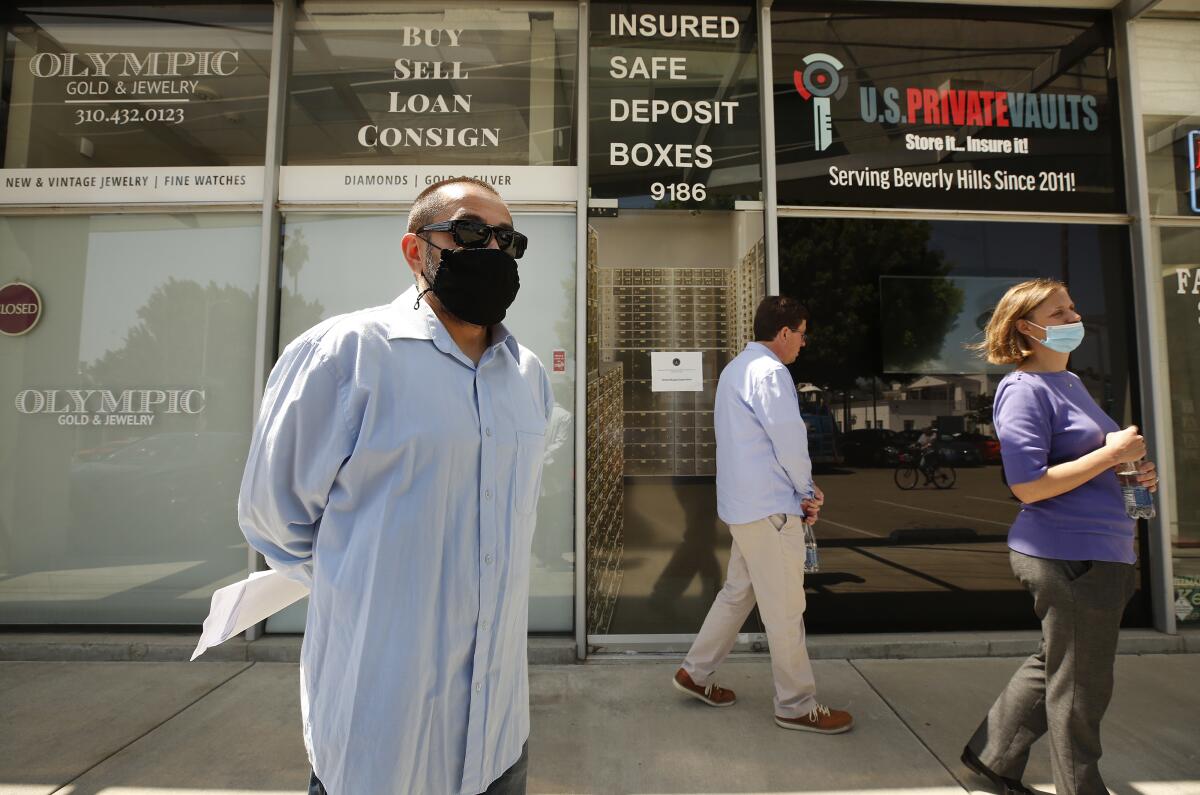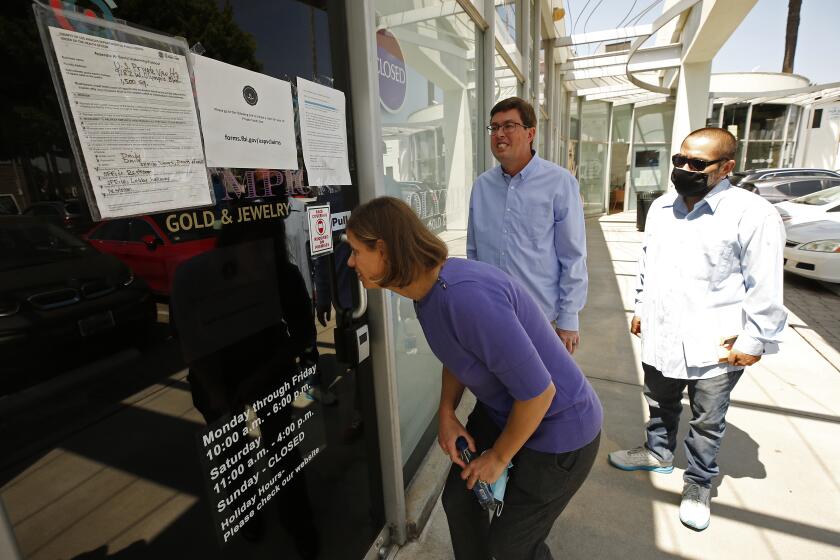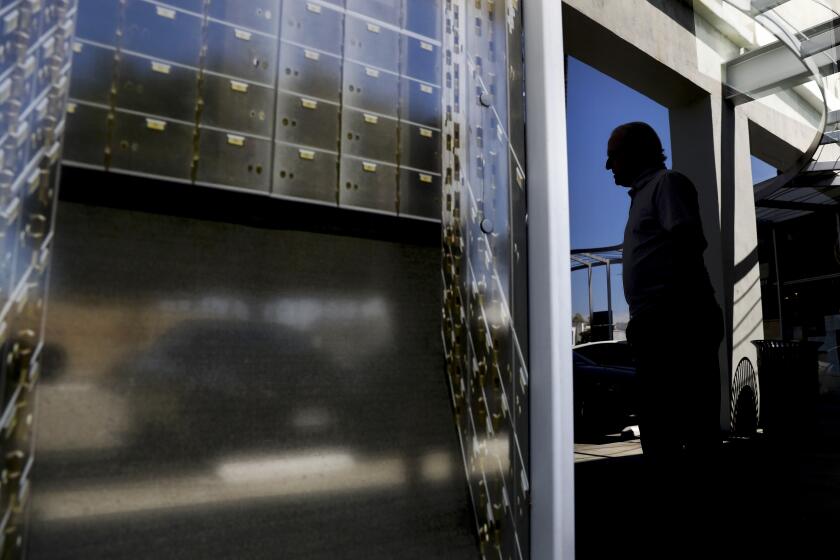FBI breached rights of Beverly Hills safe deposit box holders, judge rules
- Share via
Federal authorities have suffered two new court setbacks in their attempt to confiscate tens of millions of dollars seized from Beverly Hills safe deposit boxes that the government was legally barred from searching.
U.S. District Judge R. Gary Klausner, in rulings issued Friday, rejected prosecutors’ rationale for keeping the cash that two people stored in the boxes they rented at the U.S. Private Vaults store on West Olympic Boulevard.
The FBI is trying to confiscate about $86 million in cash and millions more in jewelry and other valuables that agents found in about 369 boxes, based on allegations that the box holders engaged in unspecified criminal wrongdoing.
Warrants authorizing the March raid of the store prohibited the government from searching whatever was inside roughly 800 boxes that contained valuables, because the FBI did not show it had probable cause to believe that evidence of crimes would be found in each one.
In the case of one box holder who sued the government under a pseudonym to recover more than $914,000 in cash, Klausner rejected prosecutors’ request to dismiss the case, saying the government had “made no showing that there is anything illicit” about the person’s money.
In the case of another box holder, Joseph Ruiz, the judge gave the government seven days to return his money or provide an adequate explanation for its attempted confiscation. Ruiz, an unemployed food-service worker from Los Angeles, said he stored his life savings of $57,000 in cash in his box.
Klausner found that “the facts and the law clearly favor” Ruiz in his claim that the government violated his rights by seizing and refusing to return the money. The government “has failed to provide any justification” for holding the cash, Klausner wrote.
Klausner said it was “troubling” that Ruiz had declared in a sworn statement that he “desperately” needed the money for food and medicine because he was living off canned foods that he had stockpiled during the pandemic.
In March, a federal grand jury indicted U.S. Private Vaults on charges of conspiring with its customers to sell drugs, launder money and structure financial transactions to dodge detection by the government. But the only customers identified by prosecutors so far are a Drug Enforcement Administration agent working undercover and some unnamed government informants.
An April court statement by a postal inspector detailed suspected laundering of drug trafficking money by one of the company’s owners, Michael Poliak, but he has not been charged publicly with any crime. The statement was first disclosed Monday by the Daily Beast. Poliak could not be reached for comment.
Customers of U.S. Private Vaults are suing the FBI over its attempt to confiscate gold and silver, jewelry and $86 million in cash from safe deposit boxes.
The FBI and the U.S. attorney’s office in Los Angeles claimed that most of the people who stored valuables anonymously in safe deposit boxes at U.S. Private Vaults were criminals, but have declined to specify crimes they allegedly committed.
An FBI spokeswoman referred questions to Thom Mrozek, a spokesman for the U.S. attorney’s office, who declined to comment.
When FBI agents and prosecutors initially asked for permission to rip all of the safe deposit boxes out of the store’s walls, U.S. Magistrate Steve Kim set strict limits. The FBI could seize the boxes, Kim decided, but had to return the contents to the owners.
“This warrant does not authorize a criminal search or seizure of the contents of the safety deposit boxes,” Kim said in his March 17 authorization.
Ruiz, 47, is skeptical that the FBI will return his money.

“I can’t really get my hopes up too high,” Ruiz said by telephone. “If they can just straight-up step on our Constitution and wipe their feet on it, they just can’t be trusted.”
A previous Klausner ruling blocked the government’s forfeiture of cash, gold and silver belonging to four box holders, including Ruiz, who sued the government.
Ruiz’s attorney, Robert Frommer, said it shouldn’t take a class action suit “to get the FBI to respect the 4th Amendment.”
“We call on the FBI to give up its $85-million cash grab and give people their stuff back,” Frommer said.
In another case, Asst. U.S. Atty. Andrew Brown, the prosecutor in charge of the investigation, asked Klausner to dismiss a suit brought by Charles Coe, the pseudonym of a box holder seeking the return of more than $914,000 in cash.
Brown said Coe was “a wealthy person living in the United States who has the means to hire a large law firm to do his bidding and spend well over a thousand dollars a year to store items anonymously at USPV.”
“This argument is misguided,” Klausner said Friday in an order denying the prosecutor’s request. “Though Plaintiff may indeed be a ‘wealthy person,’ Plaintiff is also a ‘person living in the United States,’ and is therefore afforded the protections of the United States Constitution.”
Brown argued that Coe should be required to identify himself or herself to the FBI so the government could investigate whether the cash was legally acquired. But Klausner agreed with the plaintiff that the government was trying to force Coe to choose between loss of the 4th Amendment protection against unreasonable search and seizure and loss of the 5th Amendment protection against self-incrimination.
Klausner rejected the government’s argument that Coe should not be able to proceed anonymously.
“Whether Plaintiff is wealthy or poor, a criminal or a model-citizen, to require Plaintiff to self-identify would leave Plaintiff vulnerable to the investigatory powers of the federal government,” Klausner wrote. The judge also said the government had “made no showing that there is anything illicit about the property it seized” from Coe’s box.
Five lawsuits say FBI overstepped its powers by seizing contents of hundreds of safe deposit boxes
Coe’s attorney Benjamin Gluck called the ruling “very significant” as the government continued to fight a dozen lawsuits over its seizure of the safe deposit boxes.
“Judge Klausner ruled quite clearly that the government cannot take a citizen’s property and use it as a hostage to enable the government to investigate that person,” Gluck said. “Judge Klausner flatly rejected that idea and said that the citizen has no obligation to provide the government any information to help the government in its investigation of that person.”
In a third ruling on Friday, Klausner dismissed a lawsuit by an anonymous plaintiff who was seeking the return of property stored in three boxes at U.S. Private Vaults but declined to identify which boxes the valuables were in. The government “may well have violated plaintiff’s constitutional rights and may well be required to return that property,” Klausner ruled. But the failure to specify box numbers effectively invalidated the claim, he found.
More to Read
Sign up for Essential California
The most important California stories and recommendations in your inbox every morning.
You may occasionally receive promotional content from the Los Angeles Times.













